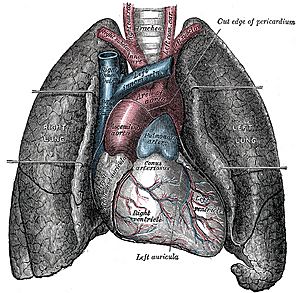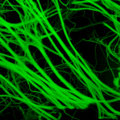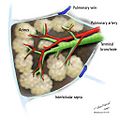Lung facts for kids

Your lungs are super important organs found in many vertebrates (animals with a backbone). Their main job is to help you breathe! They take oxygen from the air you breathe in and put it into your blood. At the same time, they take out carbon dioxide (a waste gas) from your blood and release it when you breathe out. Most vertebrates, including humans, have two lungs.
Lungs are where something amazing called "gas exchange" happens. This means oxygen moves into your blood, and carbon dioxide moves out. Without this exchange, your body's cells wouldn't get the oxygen they need to work and stay alive.
Inside your lungs, there are tiny air sacs called alveoli. These little sacs are moist, which helps oxygen easily move from the air in your lungs into the tiny blood vessels and red blood cells. Then, carbon dioxide moves from your blood into the alveoli. The blood, now full of oxygen, travels back to your heart. The carbon dioxide in the alveoli is then pushed out of your lungs when you exhale (breathe out).
Contents
How Lungs Work
Your lungs are like sponges that help your body get the air it needs. When you breathe in, air travels down your windpipe and into your lungs. Inside, the oxygen from the air gets into your blood, and carbon dioxide from your blood goes back into the air to be breathed out. This constant exchange keeps your body working properly.
Lungs in Different Animals
Not all animals have lungs exactly like ours! Lungs have changed over time to fit different animal lifestyles.
Bird Lungs
Birds have a special way of breathing that's different from mammals. Their lungs don't have alveoli like ours. Instead, they have millions of tiny tubes called para-bronchi. These para-bronchi connect to very small blood vessels called capillaries. Oxygen and carbon dioxide are continuously exchanged between the air and blood in these para-bronchi. This means birds get a steady supply of oxygen, which is great for flying!
Reptile Lungs
Reptiles, like snakes and lizards, use their ribs and muscles to breathe. Their lungs open and close as their ribs move. They also have a special muscle attached to their liver. When this muscle pulls the liver away from the lungs, it makes the lungs bigger, helping them take in more air.
Amphibian Lungs
Amphibians, like frogs, have simpler lungs. Their lungs are almost like small balloons with moist outer surfaces. This moist surface allows oxygen to pass through easily. Since frogs don't move around as much as some other animals, they don't always need a huge amount of oxygen. If they need more oxygen (like when they're in danger), they can also take in oxygen through their moist skin!
Images for kids
-
Thick elastic fibres from the visceral pleura (outer lining) of lung
-
3D rendering of a high-resolution CT scan of the thorax. The anterior thoracic wall, the airways and the pulmonary vessels anterior to the root of the lung have been digitally removed in order to visualize the different levels of the pulmonary circulation.
-
The effect of the respiratory muscles in expanding the rib cage.
-
The axolotl (Ambystoma mexicanum) retains its larval form with gills into adulthood
See also
 In Spanish: Pulmones para niños
In Spanish: Pulmones para niños
 | Frances Mary Albrier |
 | Whitney Young |
 | Muhammad Ali |












